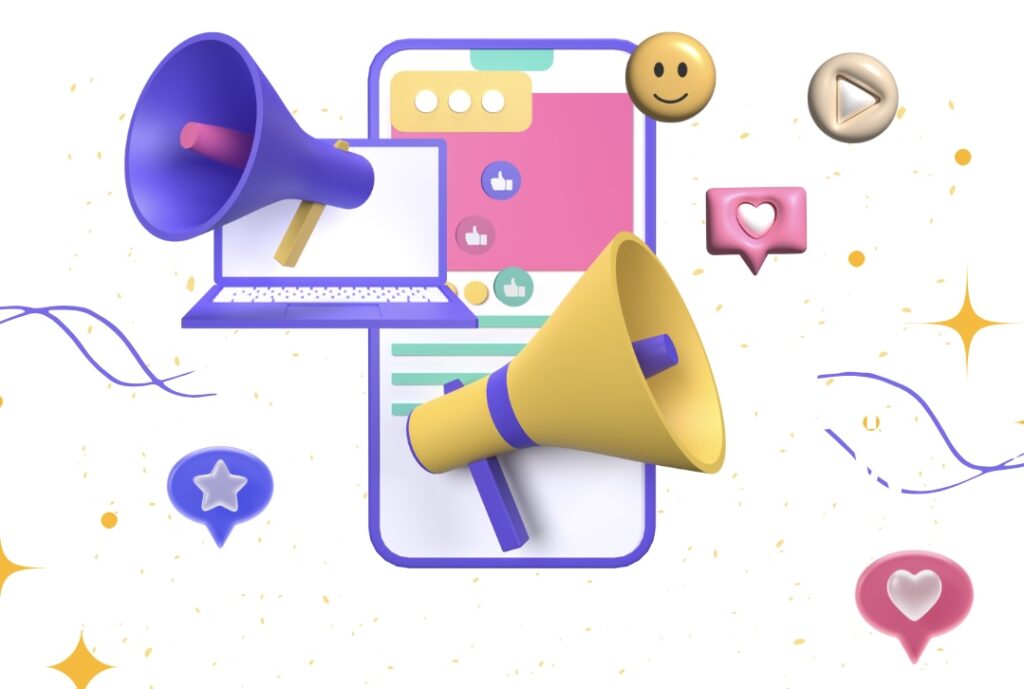Digital Marketing means promoting products, services, through the Internet and other digital platforms. Digital marketing uses online platforms and technology to reach people more effectively. It is cost-efficient, interactive and targeting own audience to making it a great way for businesses to connect with their audience.

When Digital Marketing Started
Digital marketing started in the 1990s when the Internet became available to everyone. As people started spending more time online, Agencies diagnosed the opportunity to attain capability customers through digital methods. Digital Marketing started with email marketing and search engine in 1990s, Businesses realized they could reach customers with social media platforms, Then Facebook and Twitter marketing started in the 2000s.
The Future Of Digital Marketing
AI and Automation AI tools can help businesses personalize their marketing efforts, analyze customer data, and even manage customer interactions through chatbots. This can save time and deliver a better customer experience.
Interactive Content Quizzes, polls, and interactive videos are becoming popular. They engage customers better than static content and make them feel involved.
Social Commerce Platforms like Instagram and Facebook now let users shop directly from posts. This trend makes it easier for customers to buy products without leaving social media.
5G Technology Faster internet speeds from 5G networks mean smoother online experiences, especially for video streaming and mobile apps. Marketers can create richer, high-quality content without worrying about slow connections.
Voice Search More people are using devices like Alexa, Siri, and Google Assistant to search for information. Businesses need to optimize their content to match how people speak when searching by voice.
Growth of Influencer Marketing Influencer marketing will continue to grow, with brands partnering with niche influencers who have a loyal following. This approach can be more authentic and effective than traditional ads.
Parts Of Digital Marketing
1. Search Engine Optimization (SEO)
- SEO helps your website appear higher in search engine results. By using the right keywords and improving your site’s design and speed, you can attract more visitors. SEO takes time but builds trust and visibility.
2. Social Media Marketing
- Promote your products on social media platforms like Instagram, Facebook, or LinkedIn. Social media lets you interact with your audience, create brand loyalty, and run targeted ad campaigns.
3. Analytics and Data
- Tools like Google Analytics help track how well your campaigns are working. Use this data to improve your strategies and achieve better results.
4. Affiliate Marketing
- Work with affiliates who promote your product and earn a commission for every sale or lead they bring. It’s a cost-effective way to expand your reach.
5. Pay-Per-Click Advertising (PPC)
- PPC means paying for ads that show up when people search for certain terms or visit social media. You only pay when someone clicks on your ad. It’s a quick way to reach your audience.
For More Details [What is Google Ad]
6. Email Marketing
- Send personalized messages to your customers through email. This can include newsletters, offers, or updates, helping you stay connected and drive sales.
7. Video Marketing
- Videos are a powerful way to engage people. Platforms like YouTube and TikTok are great for sharing tutorials, product demos, or stories about your brand.
8. Content Marketing
- This involves creating useful and interesting content like blog posts, videos, or infographics. Good content helps you educate your audience and build a connection with them, while also supporting other marketing strategies like SEO.
Why Digital Marketing Matters
1. Reach More People
- The internet lets you connect with people all over the world, even if you’re a small business.
2. Target Specific Audiences
- You can show ads to people based on their age, location, or interests, making your campaigns more effective.
3. Engage With Customers
- Platforms like social media let you talk directly to your audience, building trust and loyalty.
4. Adapt Quickly
- You can adjust your campaigns in real time based on how they’re performing, ensuring better results.
5. Track Performance
- Digital tools let you measure how well your campaigns are working. You can see what’s working and what isn’t, making it easier to improve.
6. Save Money
- Digital marketing is cheaper than traditional advertising methods like TV ads but often delivers better results.
Tips For Success in Digital Marketing
1. Set Clear Goals
- Know what you want to achieve, like increasing sales, getting more website visitors, or building brand awareness.
2. Use Multiple Channels
- Combine social media, email, and ads to reach your audience in different ways. This creates a stronger overall strategy.
3. Know Your Audience
- Understand what your customers need, like, and want. This will help you create campaigns that speak directly to them.
4. Create Quality Content
- Make content that is helpful, interesting, and relevant to your audience. Good content builds trust and encourages engagement.
5. Analyze and Improve
- Keep checking how well your campaigns are doing. Make changes to improve performance, like testing different ad designs or email subject lines.
6. Build a Great Website
- Your website should be easy to use, mobile-friendly, and fast. It’s often the first impression customers have of your business.
For More Detail on Digital Marketing you can go on this website [what is Advanced digital marketing]
Conclusion
Digital marketing is essential for businesses of all sizes. By using online tools and strategies, you can connect with your audience, grow your brand, and achieve your goals. Whether you’re just starting or looking to improve, understanding the basics of digital marketing will help you succeed in today’s digital world.